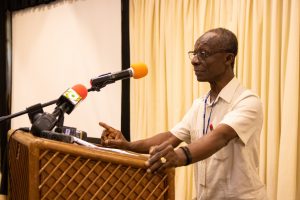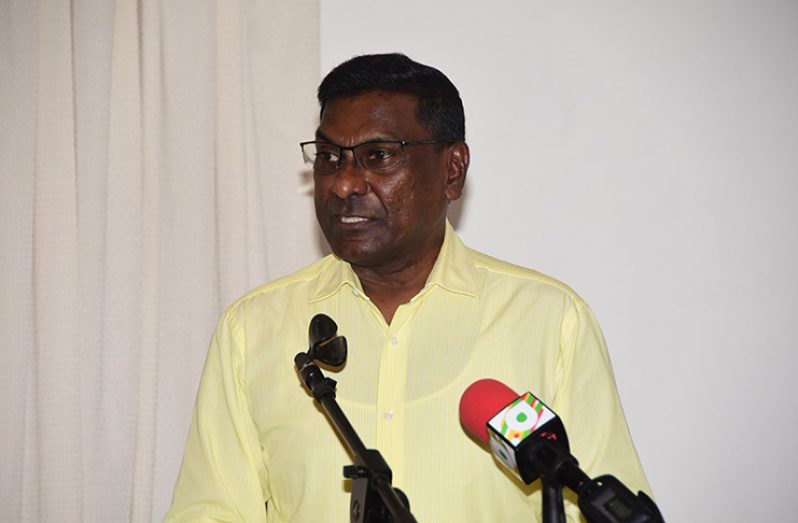– geared at ensuring optimum health care for all citizens
By Rabindra Rooplall
THE Guyana National Medicine Policy (GNMP) was launched on Thursday with the aim to bring about significant improvements in the rational use of medicines while addressing pharmaceutical problems and treatment outcomes countrywide.
The launch was held at Herdmanston Lodge, Queenstown, Georgetown and saw attendance of Public Health Minister, Volda Lawrence; Chief Medical Officer (CMO), Dr. Shamdeo Persaud; PAHO/WHO Representative, Dr. William Adu-Krow; and Director and Deputy Director of the National Pharmacy Services, Oneal Atkins and Leevan DeSantos.
Minister Lawrence said the policy document establishes a pathway for all citizens to receive optimum healthcare, which includes access to and responsible use of quality medical supplies.

“Government has been focused on its commitment to better the lives of Guyanese, demonstrating this in the 2019 budgetary allocations to the health sector which represented 11.9 per cent of the total budget for healthcare,” Minister Lawrence said.
She said the Public Health Ministry has been pursuing an aggressive agenda of development in all sectors in the healthcare system with a view of proving equal and equitable access to all.
In recognition of the urgent need for the policy document in guiding the decisions of the pharmaceutical sector and the health sector in general, the minister said tremendous efforts were made to revise what has been in limbo since 2007.
Minister Lawrence explained that the development of the GNMP was primarily undertaken with the overarching vision that the research, manufacturing, procurement, storage, distribution, prescription, dispensing and administration and disposal of all medicines are done according to best practices and legislative requirements.
SAFETY AND EFFICACY
“We want to guarantee the safety and efficacy of medicines, we want to see results, when we give persons medicines we want it to impact whatever are their medical concerns,” she said.
The minister said the Ministry of Public Health is responsible for all persons in Guyana, not just Guyanese.
She said the implementation of the GNMP falls under the National Pharmacy Services with the aim of providing quality pharmaceutical services as an arm of the health sector.
The health minister said citizens should be able to access the right quality medications at an affordable cost to the country.
“According to the World Health Organisation (WHO), rational drug use requires that the patients receive drugs appropriate to their clinical needs in doses that meet their requirements,” she said.
She continued, “These drugs must be of acceptable quality and available at affordable and the lowest cost to patients and the community, we signed onto that as a country, and what we are doing is fulfilling a part of that mandate.”
The GNMP covers all aspects of pharmaceutical services in Guyana. These include manufacturing, supply chain systems, medicine regulation, quality assurance, monitoring and evaluation, financing, selection and rationale use.
PAHO/WHO Representative, Dr. William Adu-Krow, said the policy will strengthen information systems for health to monitor and evaluate the quality, provision, access and the use of medical products.
He explained that the policy will also support decision-making for the distribution and avocation of rudimentary levels to meet the demand and supply for patients and the healthcare system.
ESSENTIAL
Dr. Adu-Krow said standards are very essential in ensuring people receive the right medication.
“I took five antibiotics from reputable pharmaceutical shops and sent them to Australia, it came back that three were worthless, not only the fact that we are deceiving people who are taking the medication thinking that they will get better, but in the case of kids and pregnant women, we are just killing them, so standards are a major issue,” Dr. William Adu-Krow said.
Another issue, he said, was inappropriate handling which can also affect quality since many medications are transported in the heat of the sun at the back of vans, while noting that general storage is also essential in preserving quality.
CMO Dr. Shamdeo Persaud said medicine policy helps countries to guide the process by which medicines are selected for use in the country.
He said the guidelines are a benchmark for medical practice.
“So even if someone receives treatment for a condition in the private sector and it is not in accordance with that guidelines, they may have a reason to contest such treatment and even seek recourse for inappropriate treatment. We know that our main focus in this final phase of implementation of health vision 2020 is on achieving universal health coverage,” he said.
With approximately 380 health facilities countrywide, the CMO said medicines and human resources are needed to respond to more than 88,000 persons with hypertension, who need medication.
“Another 62,000 persons need to be treated for diabetes and that number is growing. Along with its complications, we deal with another 20,000 persons. For the communicable diseases: HIV, tuberculosis and malaria, more than 35,000 persons need to be treated annually,” he said.
As such, the rationale use of medicine, he said, is a critical part of the whole process of ensuring medicines that are provided by the national system and throughout the healthcare services are safe.




.png)









